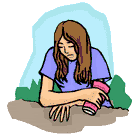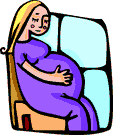

|
Pregnancy and Drug and Alcohol Addiction Treatment |
A continuing education course for 15 ces
Fulfills
BBS mandatory prelicensure requirement for California Social Workers |
and
National Institute on Drug Abuse
National Institutes of Health
Principles of
Drug Addiction
Treatment
A research-based guide
and
Helping Patients Who Drink Too Much
A Clinician's Guide
and
A Clinician's Guide Medications update
Drug
and Alcohol Addiction Treatment
and Addiction and Pregnancy Learning Objectives Clinicians will be able to: 1.
Apply the Principles
Of Effective Treatment with
people who are drug addicts. 4. Make appropriate referrals and coordinate services. 5. Define substance abuse treatment in the context of counseling, family systems, and community education. 6. Describe the importance of cultural competence in regard to substance abuse treatment 7.
Demonstrate professional
and ethical responsibilities. 9.
Know the goals and components of substance
abuse treatment with pregnant women.
|
maintains responsibility for the program. |

|
Principles Of Effective Treatment 1. No single treatment is appropriate for all individuals. Matching treatment settings, interventions, and services to each individual’s particular problems and needs is critical to his or her ultimate success in returning to productive functioning in the family, workplace, and society. 2. Treatment needs to be readily available. Because individuals who are addicted to drugs may be uncertain about entering treatment, taking advantage of opportunities when they are ready for treatment is crucial. Potential treatment applicants can be lost if treatment is not immediately available or is not readily accessible. 3. Effective treatment attends to multiple needs of the individual, not just his or her drug use. To be effective, treatment must address the individual’s drug use and any associated medical, psychological, Social, vocational, and legal problems. 4. An individual’s treatment and services plan must be assessed continually and modified as necessary to ensure that the plan meets the person’s changing needs. a patient may require varying combinations of services and treatment components during the course of treatment and recovery. In a ddition to counseling or psychotherapy, a patient at times may require medication, other medical services, family therapy, parenting instruction, vocational rehabilitation, and social and legal services. It is critical that the treatment approach be appropriate to the individual ’s age, gender, ethnicity, and culture. 5. Remaining in treatment for an adequate period of time is critical for treatment effectiveness. The appropriate duration for an individual depends on his or her problems and needs (see pages 13-51). Research indicates that for most patients, the threshold of significant improvement is reached at about 3 months in treatment. after this threshold is reached , additional treatment can produce further progress toward recovery. Because people often leave treatment prematurely, programs should include strategies to engage and keep patients in treatment. 6. Counseling (individual and/or group) and other behavioral therapies are critical components of effective treatment for addictIon. In therapy, patients address issues of motivation, build skills to resist drug use, replace drug-using activities with constructive and rewarding nondrug-using activities, and improve problem-solving abilities. Behavioral therapy also facilitates interpersonal relationships and the individual ’s ability to function In the family and community. (Pages 37-51 discuss details of different treatment components to accomplish these goals.) 7. Medications are an important element of treatment for many patients, especially when combined with counseling and other Behavioral therapies. Methadone and levo-alphaacetylmethadol (LaaM) are very effective in helping individuals addicted to heroin or other opiates stabilize their lives and reduce their illicit drug use. Naltrexone is also an effective medication for some opiate addicts and some patients with co-occurring alcohol dependence. For persons addicted to Nicotine, a nicotine replacement product (such as patches or gum) or an oral medication (such as bupropion) can be an effective component of treatment. For patients with mental disorders, both behavioral treatments and medications can be critically important. 8. Addicted or drug-abusing individuals with coexisting mental disorders should have both disorders treated in an integrated way. Because addictive disorders and mental disorders often occur in the same individual , patients presenting for either condition should be assessed and treated for the co-occurrence of the other type of disorder. 9. Medical detoxification is only the first stage of addiction treatment and by Itself does little to change long-term drug use . Medical detoxification safely manages the acute physical symptoms of withdrawal associated with stopping drug use. While detoxification alone is rarely sufficient to help addicts achieve long-term abstinence, for some individuals it is a strongly indicated precursor to effective drug addiction treatment (see pages 25-35). 10.Treatment does not need to be voluntary to be effective. Strong motivation can facilitate thetTreatment process. Sanctions or enticements in the family, employment setting, or criminal justice system can increase significantly both treatment entry and retention rates and the success of drug treatment interventions. 11.Possible drug use during treatment must be monitored continuously. Lapses to drug use can occur during treatment. The objective monitoring of a patient’s drug and alcohol use during treatment, such as through urinalysis or other tests, can help the patient withstand urges to use drugs. Such monitoring also can provide early evidence of drug use so that the individual’s treatment plan can be adjusted. Feedback to patients who test positive for Illicit drug use is an important element of monitoring. 12.Treatment programs should provide assessment for HIV/AIDS, hepatitis B and C, tuberculosis and other infectious diseases, and counseling to help patients modify or change behaviors that place themselves or others at risk of infection. Counseling can help patients avoid high-risk behavior. Counseling also can Help people who are already infected manage their illness. 13.Recovery from drug addiction can be a long-term process and frequently requires multiple episodes of treatment. As with other chronic illnesses, relapses to drug use can occur during or after successful treatment episodes. addicted individuals may require prolonged treatment and multiple episodes of treatment to achieve long-term abstinence and fully restored functioning. Participation in self-help support programs during and following treatment often is helpful in maintaining abstinence. |

| One
of the best opportunities we have to approach and intervene with the
substance-using woman is when she is pregnant. The child's birth may
give her a powerful motive to seek treatment for her addiction. Early
intervention efforts during the prenatal period increase the likelihood
that she will successfully recover from alcohol and other drug abuse. It is equally important to provide the pregnant, substance-using woman with optimal, comprehensive obstetrical care. The results of prenatal drug exposure are well documented and can include intrauterine growth retardation, prematurity and low birth weight, central nervous system damage, and congenital physical malformations, among others. A continuum of followup services is a third critical element for an improved quality of life for the substance-using woman and her family. She often lives in a stressful environment that may include physical and sexual abuse, single parenthood, and limited financial and social support. Interventions during the postnatal period are needed to help her successfully parent her child, abstain from the use of alcohol and other drugs, and address complex social needs. |
Fulfills
BBS mandatory prelicensure requirement for California Social Workers |
| www.psychceu.com adheres
to the American Psychological Association's
Ethical Principles of Psychologists. Our courses
are carefully screened by our Planning Committee to adhere to
APA standards. We also require authors who compose Internet courses
specifically for us to follow APA ethical standards. Many of our courses contain case material, and may use the methods of qualitative research and analysis, in-depth interviews and ethnographic studies. The psychotherapeutic techniques depicted may include play therapy, sandplay therapy, dream analysis, drawing analysis, client and therapist self-report, clinical vignettes, etc. The materials presented may be considered non-traditional and may be controversial, and may not have widespread endorsement within the profession. www.psychceu.com maintains responsibility for the program. |
All material included in this course is either in the public domain, or used with express permission. |
| What
Is a TIP? Treatment Improvement Protocols (TIPs) are best practice guidelines for the treatment of substance use disorders, provided as a service of the Substance Abuse and Mental Health Services Administration's (SAMHSA) Center for Substance Abuse Treatment (CSAT). CSAT's Office of Evaluation, Scientific Analysis and Synthesis draws on the experience and knowledge of clinical, research, and administrative experts to produce the TIPs, which are distributed to a growing number of facilities and individuals across the country. The audience for the TIPs is expanding beyond public and private treatment facilities for substance use disorders as substance use disorders are increasingly recognized as a major problem. |

All material appearing in this volume except that taken directly from copyrighted sources is in the public domain and may be reproduced or copied without permission from the Substance Abuse and Mental Health Services Administration's (SAMHSA) Center for Substance Abuse Treatment (CSAT) or the authors. Citation of the source is appreciated.
Cost of the 15 unit course is $165
![]()
|
Thank you! |
888-777-3773
|
|

|